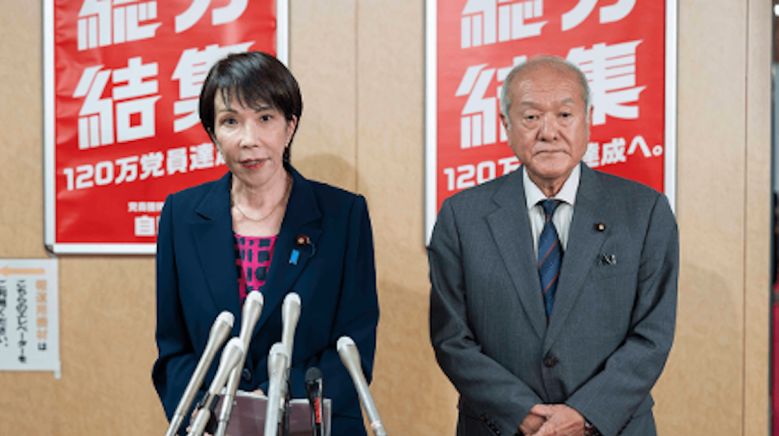Politics
Komeito Exits Coalition, Leaving Japan’s LDP Facing Challenges

The Japanese political landscape has shifted dramatically as the centrist party Komeito announced on October 6, 2023, that it will not renew its coalition with the ruling Liberal Democratic Party (LDP). After a lengthy meeting between Komeito leader Tetsuo Saito and LDP president Sanae Takaichi, the decision marks the end of a partnership that has lasted since 1999. This departure leaves the LDP significantly short of a working majority in the national legislature, creating uncertainty for the party’s governance.
Komeito, which holds 24 seats in the House of Representatives and 21 in the House of Councillors, has cited a range of factors for its withdrawal. These include declining electoral support, a loss of public trust in the LDP following scandals, and dissatisfaction among Komeito supporters regarding compromises made during the coalition’s tenure. The LDP now finds itself twenty-five seats short of a majority in the upper house and thirty-seven seats in the lower house, complicating its legislative agenda and raising questions about Takaichi’s ability to secure the prime ministership.
The coalition has faced significant challenges over the years, particularly during the latter part of Shinzo Abe‘s administration, which required Komeito to navigate the ambitions of a strong conservative agenda. Following Abe’s assassination in July 2022, the coalition endured additional strains, notably due to scandals involving the LDP’s connections with the Unification Church and a controversial slush fund.
Komeito’s electoral support has declined significantly, from over 6.5 million votes in the 2019 upper house elections to just 5.2 million votes this year. This decline is attributed not only to demographic shifts but also to internal changes within the Soka Gakkai organization, of which Komeito is a political arm. The party’s leadership, particularly under Saito, felt that its association with the LDP had come at a considerable cost.
Takaichi’s leadership style has also contributed to the coalition’s unraveling. Early actions, including a secret meeting with Yuichiro Tamaki, the leader of the Democratic Party for the People (DPFP), and the inclusion of scandal-tainted figures in her leadership team, have been perceived as alienating to Komeito. Additionally, Taro Aso, a prominent LDP figure, previously referred to Komeito as a “cancer” within the coalition, exacerbating tensions.
As the LDP grapples with these challenges, the timeline for electing a new prime minister remains uncertain. The Diet was scheduled to convene for an extraordinary session on October 15, 2023, to officially accept Shigeru Ishiba‘s resignation and select Takaichi as prime minister. However, the need to finalize a coalition agreement with Komeito has delayed this process. With the LDP holding only 196 seats, there are potential paths for opposition parties to unite and challenge Takaichi’s candidacy, making the situation increasingly precarious.
Efforts to form a new coalition face significant obstacles. No single opposition party possesses enough seats to form a majority, and both the DPFP and Ishin no Kai have expressed reluctance to partner with the LDP due to reputational concerns. These parties prefer to negotiate policy initiatives without being tied to a government facing instability.
Despite these challenges, there are signs of potential cooperation among opposition parties. The CDP has attempted to rally support not just for its leader, Noda Yoshihiko, but also for Tamaki, framing the current political situation as a rare opportunity to unseat the LDP. However, skepticism remains about the ability of these parties to overcome their differences and form a cohesive alternative government.
Komeito’s future role in the political landscape remains uncertain. The party aims to maintain relevance without the LDP’s backing, and while it has pledged not to become a mindless opposition, it faces a significant identity crisis. Komeito may increasingly resemble the Japanese Communist Party, focusing on proportional representation and local elections while losing its previous influence over national policy.
The implications of Komeito’s departure are profound for Japan. With no party currently able to secure a governing majority, political instability is likely to deepen. The inability of the government to make difficult decisions regarding fiscal policy, defense spending, and social security reform could lead to a vacuum in Japan’s political voice on both regional and global stages. This upheaval may also pave the way for anti-establishment parties, such as Sanseito, to gain traction among disillusioned voters.
In summary, Japan’s political environment is shifting rapidly, with Komeito’s exit from the coalition marking a noteworthy inflection point. The LDP now faces a challenging path forward, with the potential for increased instability and a reconfiguration of power among opposition parties.
-

 Business5 months ago
Business5 months agoKenvue Dismisses CEO Thibaut Mongon as Strategic Review Advances
-

 Lifestyle4 months ago
Lifestyle4 months agoHumanism Camp Engages 250 Youths in Summer Fest 2025
-

 Sports4 months ago
Sports4 months agoDe Minaur Triumphs at Washington Open After Thrilling Comeback
-

 Sports5 months ago
Sports5 months agoTupou and Daugunu Join First Nations Squad for Lions Clash
-

 Top Stories5 months ago
Top Stories5 months agoColombian Senator Miguel Uribe Shows Signs of Recovery After Attack
-

 World5 months ago
World5 months agoASEAN Gears Up for Historic Joint Meeting of Foreign and Economic Ministers
-

 Health4 months ago
Health4 months agoNew Study Challenges Assumptions About Aging and Inflammation
-

 Business5 months ago
Business5 months agoOil Prices Surge Following New EU Sanctions on Russia
-

 Entertainment4 months ago
Entertainment4 months agoDetaşe-Sabah Violin Ensemble Captivates at Gabala Music Festival
-

 Entertainment4 months ago
Entertainment4 months agoBaku Metro Extends Hours for Justin Timberlake Concert
-

 Top Stories5 months ago
Top Stories5 months agoRethinking Singapore’s F&B Regulations Amid Business Closures
-

 Business5 months ago
Business5 months agoU.S. House Approves Stablecoin Bill, Sends to Trump for Signature









